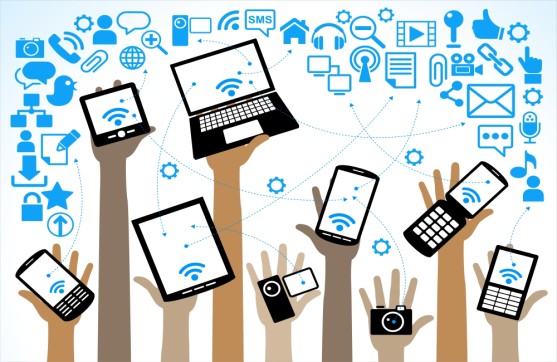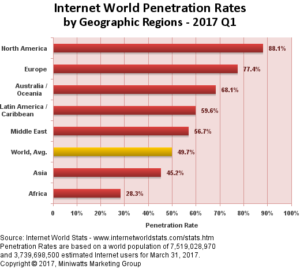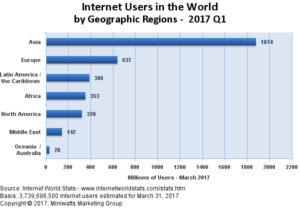
4 billion people offline living on the 4th industrial revolution
More than 51 percent of the world’s population remains offline. Without removing the impediments to Internet adoption, little will change—and more than 4 billion people may be left behind. (http://www.mckinsey.com/industries/high-tech/our-insights/offline-and-falling-behind-barriers-to-internet-adoption).
The Internet has grown in a little more than a generation into a tool that is transforming how businesses, governments and people communicate. The economic impact of the internet has been massive, it has made great contributions to nations’ gross domestic product and has fueled up innovative industries. Another aspect that has changed a lot is the way the society interacts, nowadays people all over the world are connected and communicating. Also the availability of information and education has had a very strong effect on how the new generations learn.
However, not all the countries have used the Internet’s benefits to the same degree. This post will talk about the evolution of the Internet adoption around the world and the barriers that are impeding more than 51 percent of the global population from getting online.
According to the International Telecommunication Union, by the end of 2016 the number of Internet users worldwide reached 3.5 billion. (“World development indicators”, World Bank, 2016 estimates, accessed 2017. Sourced from the International Telecommunication Union). This growth has been fueled by five trends, the expansion of mobile-network coverage and increasing mobile-Internet adoption, urbanization, shrinking device and data-plan prices, a growing middle class, and the increasing utility of the Internet. (http://www.mckinsey.com/industries/high-tech/our-insights/offline-and-falling-behind-barriers-to-internet-adoption).
However, this still leaves up to 4 billion people offline. Moreover, 64 percent of these offline individuals live in rural areas, whereas 24 percent of today’s Internet users are considered rural. As much as 50 percent of offline individuals have an income below the average of their respective country’s poverty line and median income. (Grant, A. and Meadows, J. (2016). Communication Technology Update and Fundamentals. Florence: Taylor and Francis, pp.125-128).
So why does the internet matter? For individuals, the Internet provides direct consumer benefits, they can now access a wide range of information such as research tools in education and health, take advantage of e-government services and communicate with almost everyone around the world. Furthermore, the Internet alters how economic activity is organized at a fundamental level and brings accelerated innovation.
The predominant barrier for not being able to use the internet is the low income of individuals in the offline population. This barrier is exacerbated by the high costs associated with providing access to the Internet for these populations, which are disproportionately rural. The low incomes reflect the poor economic circumstances of large segments of the offline population, often including unemployment and the need for economic development, employment, and income growth opportunities in their regions. At the same time, there is often a lack of adjacent infrastructure (such as roads and electricity), thereby increasing the costs faced by network operators in extending coverage. (http://blogs.worldbank.org/ic4d/how-can-developing-countries-make-most-digital-revolution).
We could one day see the internet available to almost everyone in the world. But when that happens, will they be ready for it? A challenge exists to ensure that people have the skills, understanding and cultural/social acceptance of the internet. While there is no concrete way to link existing data with ‘internet literacy’, some obvious challenges do exist. The world’s literacy rate, for example, will continue to hold back populations in India, Africa and the Middle East, regardless of their ability to access the internet. (https://www.weforum.org/agenda/2016/02/4-reasons-4-billion-people-are-still-offline/).
Meanwhile, education as a whole remains a barrier. In a survey conducted by Facebook of 11 countries, over two thirds of those currently offline did not know what the internet is. In Nigeria, 75% of the unconnected had never heard of the word ‘internet’. (https://www.weforum.org/agenda/2016/02/4-reasons-4-billion-people-are-still-offline/).
Numerous initiatives are, however, on their way to combat these inequalities. In some cases, finding a solution to common poverty problems and digital readiness go hand in hand. In Papua New Guinea, 35% of the population is illiterate. A project called SMS Story intends to change this by not only teaching people to read, but by doing so with text messages. In Pakistan, there are currently over 120 e-villages training over 3,000 girls computer skills. That project is to be expanded to reach as many as 20,000 girls in the near future. (https://www.weforum.org/agenda/2016/02/4-reasons-4-billion-people-are-still-offline/).
Governments are setting ambitious goals for mobile-Internet coverage and investing to extend fixed-broadband infrastructure and increase public Wi-Fi access. At the same time, network operators and device manufacturers are exploring ways to further reduce the cost of access and provide service to underserved populations. In addition, content and service providers are innovating on services that could improve the economic prospects and quality of life of Internet users. (http://www.mckinsey.com/industries/high-tech/our-insights/offline-and-falling-behind-barriers-to-internet-adoption).
To be able to provide internet for every single person in the world, it will require the efforts of private industry, governments, non-profits and citizen-led initiatives to achieve this goal.
If you want to check out more statistics on the internet use worldwide you can go to: https://openknowledge.worldbank.org/handle/10986/26447 and check out the fifth chapter of the PDF.


Users who have LIKED this post:
10 comments on “4 billion people offline living on the 4th industrial revolution”
Comments are closed.


Thank you for this insightful post, Irene. Really nice work!
As you mention, access to internet means access to information, education, business resources, etc. It’s a powerful self-help tool. In Africa more people have cell phones than access to the internet [1]. Considering this, some organizations are trying to find ways to provide people with downloadable versions of Wikipedia so they can access the information without internet connectivity [2]. Of course, equal global access would be the ideal case scenario, but it is cool and encouraging what alternatives people are finding in the meantime.
Thank you again for your post!
[1] Cell Phone Statistics in Africa: http://www.pewglobal.org/2015/04/15/cell-phones-in-africa-communication-lifeline/
[2] Wikipedia offline: https://dottech.org/6803/take-wikipedia-with-you-on-the-go-surf-wikipedia-without-internet-access-i-am-serious/
Hi Irene
Thanks for the informative blog, I totally agree with you, yes for sustainable worlds growth every one should have access to information at affordable rates, but unfortunately, we do not have uniformity with regard to this, this can be due to many reasons some of them are
1. Lack of Education
2. Cost
3. Infrastructure
4. Number of older age population in the third world who have less interest towards learning the internet
In spite of all this, we do see there is constant growth world wide with the using of the internet. If you compare world wide internet penetration rates from 2014 to 2017, for example, Africa in the year of 2014 penetration rate was 26.5 % compared to 2017 it is now 28.3 % from your chart which nearly 2 % increase. Also Asia in 2014 the penetration rate was 34.7% which is 45.2 in 2017 which is nearly 11 % increase.
https://www.google.com/search?q=internet+world+penetration+rates+by+geographic+regions+2014&source=lnms&tbm=isch&sa=X&ved=0ahUKEwjbwJng1JbVAhViilQKHTCxCgEQ_AUICigB&biw=1296&bih=551#tbm=isch&q=internet+world+penetration+rates+by+geographic+regions+2014+wuc+2015&imgrc=OUuKjBNMuekYYM:
Also, one more report states usage of internet in India is growing at a very fast rate:
https://www.google.com/searchq=world+internet+penetration+rates+by+geographic+regions+2015&source=lnms&tbm=isch&sa=X&ved=0ahUKEwjiuca8z5bVAhVjzlQKHZQfAc0Q_AUICigB&biw=1600&bih=832#imgrc=HEH2ojY6P7XibM:
Irina Bokova, the Director-General of the UN Educational, Scientific and Cultural Organization (UNESCO) mentioned in a report “The 2030 Agenda recognizes the power of new technologies to accelerate human progress, to bridge the digital divide, to develop knowledge societies – we must do everything to support States in reaching these goals, especially developing States,”
So we hope to see some more changes in coming years, especially in developing countries.
But if we compare the growth rate between Africa and Asia, it is clear that Africa is little behind which I strongly feel UNESCO should address to bring them to the same pace.
So to sum up, information access make big differences and the third world should come to the same pace as developed nations, and this will definitely improve in coming days as we see below report gives us a more clear picture on this:
http://www.internetlivestats.com/internet-users/
At this age and time, there must be a very good reason why these 4 billion people do not have internet. I believe it all goes down to poverty and scarcity which leads to slow development. Would I need internet if I don’t have access to quality food, housing, health and education? I guess not. As long as these people do not have basic needs – food, water, health, housing, energy and education, internet will always be a secondary need. Nevertheless, individuals more than community are catching up with the adoption of technology. In the most rural parts of Kenya, where there is no piped water, electricity or comfortable housing, I have seen people embrace mobile technology pretty fast. Many people from the villages would know what Facebook is. The younger generations are catching up even faster. Industry leaders like Facebook and Google are developing technology to accelerate the access of internet to everyone; I believe that it is just a matter of time before the whole world is connected.
I think it will be interesting to see the social, political, and economic effects of this huge number of individuals coming “online” over the next several decades. While in the West we view the availability of the incredible amounts of information the internet provides as a net positive, the process has not occurred without some pain. The Arab Spring was largely energized by access to social media and online video sharing, and repressive regimes across the world have learned their lesson. While I think it is unlikely that they will succeed over the long term, China, North Korea, and even Russia to a certain extent are determined to shut down dissent and insulate their political systems from possible liberalizing shocks. Thus I think we can’t just look at internet access but also open internet access as a gauge for progress on this front, and viewed through this lens the current situation is even more bleak than your numbers suggest.
I think you’ve come across some interesting research Irene. I want to agree with Patricia’s comment regarding the basic needs of individuals. If we take a look at Maslow’s Triangle of Basic Needs: Having access to the internet will be located in the middle of the triangle while basic needs such as a house, food etc forms the foundation of this triangle. It is therefore not surprising to see that so many people in rural communities have not even heard of the word ‘internet’ yet.
I think governments play a central role in the world’s connectivity to the internet. In South Africa the government has started to install free wireless connection points in rural communities. The process of connecting people to the internet will take time however. The incentive for people to connect to the internet will come from their own communities and not from outside. Word of mouth in rural communities is one of the most effective communication channels.
Africa has been known as a continent that has leap frogged many technologies (Africa got cellphones before telephone networks were installed ). What we need to take into account is that while rural communities starts learning to use a specific technology the next technology (or upgraded version) would have been already developed. Technological education for such societies with complex social problems need to be well thought through.
Thank you for your comment Dewald. I completely agree with you, technological education is going to be a very big issue even when everybody has access to the network. I think technology is changing the way the society works and eventually it will reach the people that right now don’t even know the word internet and that change in the way that society works will redefine our world so we’ll see what becomes of this world…
I was inspired by the topic of this article to think further about what it means that 4 billion people are “still” offline. Also, when Dewald mentioned about the Maslow’s Triangle of Basic Needs in the comment above, I remembered that that Triangle is lacking the crucial factor of social connection and collaboration, as claimed by Pamela Rutledge in 2011, for example. [1] “In reality, Rutledge’s rewired version of psychological needs suggests a more realistic set of multiple paths, through social connection, to meet our varying psychology needs.”, Steve Denning sums up [2].
When checking the given source of Irene, the “Offline and falling behind” report from McKinsey in 2014, I read that “between 1.1 billion and 2.8 billion individuals cannot get online via the mobile network because they do not live within sufficient mobile network coverage” [3].
This made me wonder, also regarding the Maslow’s rewired graph, if internet could fall under that red bubble of Connection? [2 – see graphic Maslow’s ” rewired]. People seek internet and the information and possibilities that come with it, and would possibly trade food for this access. Has internet become a basic need? I agree that the other basic needs should be covered first, but maybe through internet access this could happen even quicker?
[1] https://www.psychologytoday.com/blog/positively-media/201111/social-networks-what-maslow-misses-0
[2] https://www.forbes.com/sites/stevedenning/2012/03/29/what-maslow-missed/#609568cd661b
[3] [http://www.mckinsey.com/industries/high-tech/our-insights/offline-and-falling-behind-barriers-to-internet-adoption]
Thank you for your comment Sara. I think the world is still trying to figure out if the Internet qualifies as a basic need given that still billions of people around the world don’t even have shelter and food, so first we would have to provide them with food, shelter and electricity to them introduce them to the network but it seems like it will take a long time and people will be left far behind in terms of intellectual means.
Hi Irene and thanks for an interesting read!
What I personally find interesting is the quite recent trend of private companies (usually mega corporations with online focus) having enough economic incentives to start solving the issue of lacking connectivity in certain areas by themselves (without government help or even carrier partnerships). Theoretically this happens, when the expected and discounted lifetime profit from a customer exceeds the costs of providing him or her with internet access.
The whole concept is definitely a bit hard to grasp, but a prime example would be Facebook, which has a main mission of adding ”the next billion” users to its social network, with a focus on consumers in emerging markets and the mobile devices that many of them will use as their primary route to getting online.
The best-known Facebook initiative is called ”Facebook Zero”, which is an initiative in collaboration with mobile-based Internet providers to waive data charges for accessing text-only version of its site.
Facebook also had a string of acquisitions related to internet access including a Finnish company, Pryte (acquired 2014), which developed a technology that lets app makers and carriers sell mobile data in incremental and very cheap packages based around a specific app’s parameters (e.g Facebook could offer 1 day of cheap Facebook-only internet access for a few cents).
Overall, I’m very optimistic that through indirect economic incentives, a lot of the above-mentioned advantages of universal internet access will be unleashed within the next decade or two.
Thank you for comment Rasmus. The information that you posted about Facebook it very interesting because that may be the only way people around the world will get access to internet. Having said that, may be the only way to reach all the people in the world is through the big companies such as Facebook and AT&T.